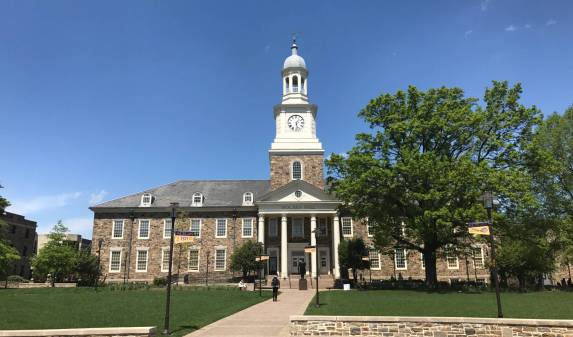How to encourage digital citizenship in the classroom

Teaching students how to become digital citizens is essential as technology assumes a greater place in their lives. Students can become more digitally responsible by thinking critically about what they see online, recognizing the benefits and risks of sharing information, and balancing screen time with other activities.
In a recent webinar hosted by edWeb.net, edtech experts introduced tips for launching or expanding digital citizenship in their schools. Wanda Greenfield, a tech integration specialist at Jesse Boyd Elementary School in Spartanburg, South Carolina, outlined ideas for molding students into digital citizens.
For teachers new to digital citizenship or who have limited planning time, Greenfield recommended ready-to-use activities — many are available through Common Sense Education — including her favorite, Digital Tattoo, which invites learners to examine their digital footprints. Using non-permanent markers, students mark their arms or hands in response to a prompt and then share what their design says about their digital imprint. The goal is to demonstrate that what they do online remains forever, like a tattoo.
Greenfield said teachers can link this activity to a lesson or a video, and further boost student understanding through various other activities. Students can produce text about digital citizenship using tools like BookCreator, PowerPoint or Prezi. They can co-develop an anchor chart as the teacher highlights digital expectations such as citing online resources and not surfing the internet in class. Teachers can also encourage students to sign the Common Sense Digital Citizenship Pledge.
Another option is for learners to fashion their unique connections to digital responsibility through a creative task. They might produce movie trailers, public service announcements, memes, comic strips, emojis, rhymes, or songs. They can also create commercials using video editing software or design digital citizenship branded posters.
Jennifer Ehehalt, a Pittsburgh regional manager at Common Sense Education, encouraged full-school community involvement in digital citizenship practices. For example, school leaders can set a required number of digital citizenship lessons to be taught during the year. Whole-grade teams can select specific lessons to weave into curricular activities. Media or instructional technology specialists can teach during electives like media and library. Older students might engage younger peers in digital citizenship lessons through classroom partnerships.
The presenters said involving school and district administration in digital citizenship campaigns also furthers desired online behaviors. Principals might issue a “tip of the day” during daily announcements or place it on a prominent message board. District administrators can produce a video modeling digital responsibility. District-wide digital citizenship calls to action can be announced on social media sites with hashtags.
Getting the entire school on board to support a culture of digital citizenship ensures the reinforcement of appropriate digital engagement. As an example of such a unified approach, Greenfield shared a project Jesse Boyd School used to promote schoolwide awareness of digital citizenship, in which all teachers teach a “digital footprint” lesson. Students, faculty, and staff sign individual footprints that are glued onto a large poster board that is mounted in the cafeteria. A banner is displayed next to a poster that reflects a school’s digital stance. Greenfield’s school’s was “Jesse Boyd Loves Digital Citizenship.” Every school member signs the banner in solidarity.
Bringing together all school stakeholders — students, faculty, staff, families, and community members — can also help foster a digital culture. Greenfield and Ehehalt said each class can create a digital citizenship videos and present them to the school for discussion. Students can present on digital citizenship issues during family night, which might provide opportunities for attendees to watch videos or play games in a computer lab and thus become more aware of the digital challenges their children face. Guest speakers can present on critical issues, such as cyberbullying.
Family activities can encourage digital responsibility at home. Families can video chat a friend or relative, listen to a podcast together or create a digital family photo book. Schools can engage families in live Facebook bedtime stories that a teacher or principal reads or host bingo games played with a teacher or principal. These activities can model appropriate digital behavior and practices.
“Digital citizens aren’t born,“ Ehehalt said, noting that teachers who celebrate and raise awareness through activities that promote collaboration, creation, and communication can shape their students into lifelong digital citizens.
About the presenters
Dr. Wanda Greenfield is the technology integration specialist at Jesse Boyd Elementary School (District 7) in Spartanburg, South Carolina, as well as a part-time adjunct instructor at Spartanburg Community College. She earned a bachelor’s degree in business administration from Florida State University, a master’s degree in elementary education from Florida Atlantic University, and her doctorate in instructional design learning from Capella University. She frequently presents at technology and education conferences.
Jennifer Ehehalt is the Pittsburgh regional manager at Common Sense Education. She is responsible for helping school districts build a culture of digital citizenship among educators, students and their families. She designs and delivers pre-K-12 professional development to support teachers in the implementation of Common Sense’s K-12 digital citizenship resources and tech integration in the classroom. She presents best practices in technology and education conferences around the country.
Join the community
Digital Learning & Leadership is a free professional learning community on edWeb.net where you can share, learn, and discuss ideas and best practices to enhance teaching with technology.
The edWeb webinar referenced above, hosted by Common Sense Education and sponsored by Symantec, can be found here.




